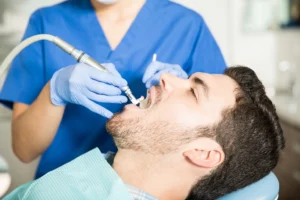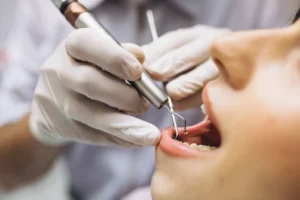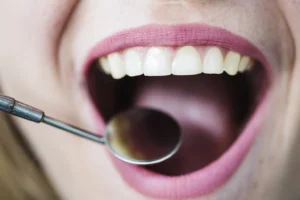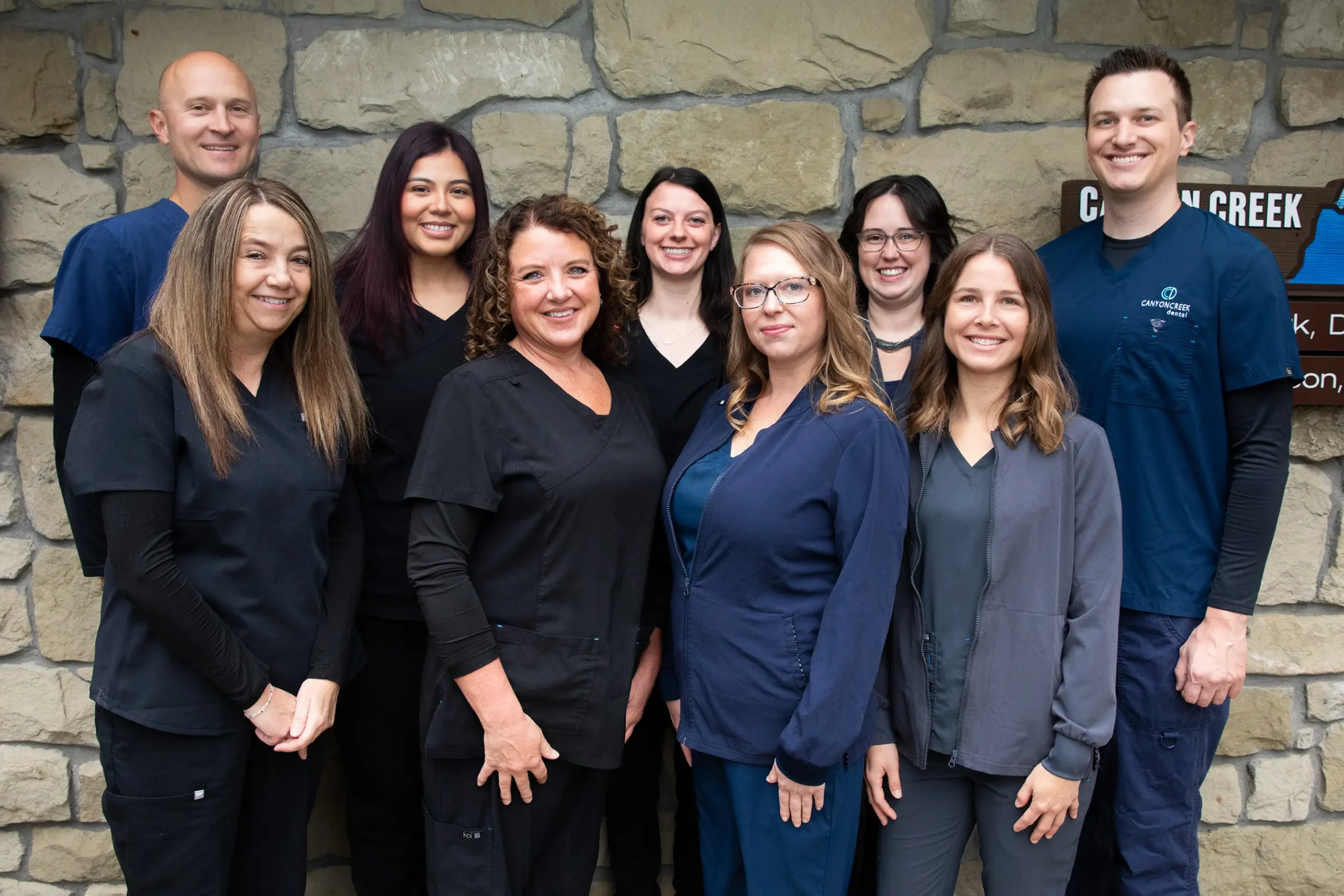Table of Contents
If you’re missing one or more teeth, you’re not alone — millions of Americans face tooth loss due to decay, gum disease, or injury. Fortunately, modern dentistry offers several reliable solutions to restore your smile. One of the most popular is the dental bridge — a natural-looking, long-lasting option that can replace missing teeth and restore normal chewing and speech.
At Canyon Creek Dental, Dr. Pearson and Dr. Clark design custom bridges that look, feel, and function just like your natural teeth. In this guide, we’ll walk you through everything you need to know about dental bridges in Billings MT, including types, procedure, costs, benefits, and how they compare to other tooth replacement options.
What Are Dental Bridges?
A dental bridge is a fixed (non-removable) restoration used to replace one or more missing teeth. It consists of:
- Abutment teeth: These are the teeth on either side of the gap, which are capped with crowns to support the bridge.
- Pontic: The artificial tooth (or teeth) that fills the space.
Bridges restore your ability to chew and speak, prevent remaining teeth from shifting, and improve the appearance of your smile.
When Are Dental Bridges Recommended?
Bridges are often recommended if you:
- Have one or more missing teeth in a row
- Want a non-removable replacement option
- Are not a candidate for dental implants
- Prefer a faster, more cost-effective solution than surgery
They’re also a great choice if you want to:
- Restore normal speech and chewing
- Prevent surrounding teeth from drifting into the gap
- Improve facial structure and support
- Enhance the appearance of your smile
Types of Dental Bridges
There are several types of dental bridges, and your dentist will help you choose the best option based on your oral health and treatment goals:
Traditional Bridge
- Most common type.
- Uses crowns on the teeth adjacent to the gap to anchor the pontic.
Cantilever Bridge
- Anchored to only one abutment tooth.
- Useful when there’s only one natural tooth next to the gap.
Maryland Bridge
- Uses a metal or porcelain framework bonded to the backs of adjacent teeth instead of crowns.
- A conservative, less invasive option.
Implant-Supported Bridge
- Anchored to dental implants instead of natural teeth.
- Offers the highest stability and longevity.
Dental Bridge Procedure: What to Expect
Most bridges require two visits to complete:
1. Preparation and Impression
During the first appointment, Dr. Pearson or Dr. Clark will prepare the abutment teeth by shaping them for crowns. A digital or physical impression of your teeth is taken and sent to a dental lab, where your custom bridge is crafted.
2. Temporary Bridge
A temporary bridge is placed to protect your teeth and gums while the permanent bridge is being made.
3. Final Placement
On your second visit, the temporary bridge is removed, and your custom bridge is checked for fit, comfort, and bite alignment. Once everything is perfect, it’s cemented securely into place.
Cost Comparison: Bridges vs. Implants vs. Dentures
Choosing a tooth replacement solution often comes down to budget, treatment time, and longevity. Here’s how dental bridges compare to other options:
| Treatment | Best For | Estimated Cost | Lifespan | Pros | Cons |
|---|---|---|---|---|---|
| Dental Bridge | 1–3 missing teeth | $2,000 – $5,000* | 10–15 years | Quick, non-surgical, natural look, cost-effective | May require altering healthy teeth |
| Dental Implant | 1+ missing teeth | $3,000 – $6,000 per tooth* | 20+ years | Permanent, preserves bone, no impact on adjacent teeth | Higher cost, requires surgery |
| Partial Denture | Several missing teeth | $1,500 – $3,500* | 5–8 years | Affordable, removable | Less stable, less natural appearance |
**These prices are estimates. Contact Canyon Creek Dental for a personalized treatment plan.
Benefits of Dental Bridges
Dental bridges offer several advantages for patients looking for a reliable tooth replacement solution:
- Restores Chewing and Speaking: Bridges allow you to eat comfortably and speak clearly again.
- Prevents Shifting: Keeps surrounding teeth in place, protecting your bite alignment.
- Improves Facial Shape: Maintains proper facial structure and prevents sagging caused by missing teeth.
- Quick Results: Most bridges are completed in just two appointments.
- Cost-Effective: Generally more affordable than implants while offering natural-looking results.
How Long Do Dental Bridges Last?
With proper care, most dental bridges last 10 to 15 years or longer. Longevity depends on your oral hygiene, diet, and habits such as grinding or chewing hard objects.
Tips to extend the life of your bridge:
- Brush and floss daily (including under the pontic with a floss threader)
- Avoid chewing on hard objects
- Schedule regular checkups with Dr. Pearson and Dr. Clark
- Address any signs of damage or discomfort early
Are Dental Bridges Right for You?
Dental bridges are an excellent solution for many patients, but they’re not the only option. If you want a faster, non-surgical restoration and have healthy teeth on either side of the gap, a bridge might be perfect. However, if you’re looking for a more permanent solution and are comfortable with oral surgery, implants could be worth considering.
The best way to decide is by scheduling a consultation. Dr. Pearson and Dr. Clark will evaluate your oral health, discuss your goals, and help you choose the treatment that’s best for you.
FAQs About Dental Bridges
1. Do dental bridges look natural?
Yes. Modern bridges are made from materials that closely match your natural teeth in color, shape, and texture.
2. Will eating feel normal again?
Absolutely. Most patients adjust to eating with their bridge within a few days.
3. How do I clean a dental bridge?
Brush and floss daily, and use a floss threader or water flosser to clean under the pontic.
4. Can a dental bridge be repaired if it’s damaged?
Minor damage can often be repaired, but significant issues may require replacement.
5. Are bridges covered by dental insurance?
Most insurance plans cover a portion of bridge treatment. Our team can help you understand your coverage.
Schedule Your Dental Bridge Consultation in Billings, MT
If missing teeth are affecting your confidence, your bite, or your ability to eat comfortably, Canyon Creek Dental is here to help. Dr. Pearson and Dr. Clark offer custom dental bridges in Billings, MT designed for a natural look and long-lasting results.
Call today to schedule your consultation and find out if a dental bridge is the right solution for your smile.




